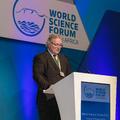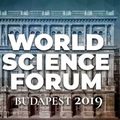Nature on World Science Forum: Science's attitudes must reflect a world in crisis
welcomes a wake-up call to science policy-makers to address the consequences of current political and economic upheavals.
Those involved in science policy sometimes seem to me to be sleep-walking through the greatest crisis to afflict the West since the Second World War. True, from the point of view of the scientists, grants continue to flow and results continue to be published. Perhaps this is why wider discourse about science's role in society has hardly budged an inch.
For the past three years, I have grown steadily more impatient with this 'business as usual' approach. Whenever an academy president or research chief stands up to speak in public, I have been waiting for them to explain how they will do things differently. They never do.
At the World Science Forum in Budapest last week, some scientific leaders finally acknowledged the new reality. In particular, representatives of developing countries — which account for a fast-growing share of global science — talked of radical reorientation of research priorities to better match the pressing needs of their populations. And behind the scenes, analysts are mapping out fascinating - and sometimes alarming - possible scenarios for global science after the crash.
Challenged by Hungarian Prime Minister Viktor Orbán to face up to the implications of the economic crisis, prominent Western representatives at the forum, such as William Colglazier, science adviser to US secretary of state Hillary Clinton, and Chris Llewellyn Smith, former chief of Europe's particle-physics laboratory CERN, failed to do so in their plenary talks. And some speakers were clearly more comfortable discussing the planet's ecological crises than the economic ones currently alarming the general population.
Questions were soon raised, however, when Princess Sumaya bint el Hassan of Jordan's Royal Scientific Society captured the mood of the developing world. “We must ask ourselves why so much scientific research is driven by the consumer needs of a tiny elite,” she said. “We're being naive if we envisage business-as-usual for science in the new century.”
Some things remained unsaid at Budapest: no one criticized science's failure to join engineering groups in highlighting the lack of solid, productive foundations for the two-decades-long boom that ended abruptly in 2008. Nor was there criticism of failure to expose the pseudoscience that underpinned the exotic financial instruments that played such a central part in both the boom and the bust.
But the forum did reveal the beginnings of a serious response by scientific leaders to the tumult ahead. Despite much cosy rhetoric about defending research funding, one uncomfortable but realistic scenario is for it to nosedive, perhaps by one-third in the United States and the United Kingdom in real terms, over the next five years. Even though other nations will spend more money, that sort of change will wreak havoc.
One great danger is that scarce funding will consolidate around single-discipline research — even though everyone knows that the most valuable work is now multidisciplinary. An associated danger, already revealed in the US Congress, is that the social sciences will be expelled from the temple — just when, as Llewellyn Smith pointed out in Budapest, the hard sciences need to invite them in to help public engagement.
But the political outcomes of the crisis aren't yet clear enough to enable scientists to plan around them. That has led the International Council for Science (ICSU) in Paris, the global association of academies and scientific societies, to conduct a foresight exercise that explores how science as a whole might change shape over the next 20 years.
An ICSU task force led by physicist John Marks has been looking at all the drivers of global science and has consolidated them into two overriding forces: engagement with society and globalization (as opposed to nationalism). Plotting these two against each other, Marks told the forum, produces four distinct scenarios for the future — whatever the level of funding.
The first and most sunny, with more globalization and high engagement, would see a series of positive outcomes, including much more interdisciplinary research. The second — more globalization but low engagement — is rather like what we had before the crash, only worse. The ICSU PowerPoint slide for this showed bunches of vainglorious yuppies with mobile phones and portable computers, doubtless creating more gizmos and expensive drugs that most people in the world can't afford. The third scenario would have more nationalism, with high engagement. That might create a series of little Denmarks pulling away from each other to deal with their own problems, with their own research strategies and regulatory regimes.
Finally, and most ominously, there's more nationalism, with less engagement. This predicts old-fashioned, stick-to-your-knitting, single-discipline science, aligned with resurgent nationalism. The slide for this one had a mushroom cloud at one stage, but Marks settled for a barely more reassuring image of some darkly lurking battleships.
The ICSU exercise isn't complete yet and not everyone sees its value. But it outlines the choices that science faces. Scientists have always cultivated globalization, and can keep pushing for it. Engagement is different; a tribal disdain for the social sciences still holds sway in the laboratory, as does a haughty disregard for the views and demands of the general public. Both outlooks need to be jettisoned if science is to contribute and thrive in this new world.






